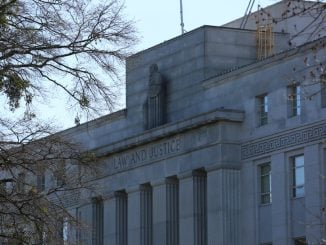
RALEIGH — This term Supreme Court justices will consider major cases on voting rights, religious liberty, union funding and class-action suits. The court now has a 5-4 conservative majority with President Donald Trump’s nominee, Justice Neil Gorsuch, on the bench.
Does partisan gerrymandering violate the Constitution?
On Tuesday the court heard arguments in a case that could influence American politics for decades, particularly in N.C. They are taking up a fight over electoral maps drawn by Wisconsin Republicans that a lower court ruled were designed to entrench themselves in power.
The nine justices will consider the lawfulness of partisan gerrymandering, the long-standing practice of manipulating the boundaries of electoral districts to benefit one party, and whether in this case Republicans intended to hobble Democrats.
Wisconsin is appealing a lower court’s ruling that the electoral map drawn by state Republicans violated the constitutional rights of voters. Wisconsin Republicans argue that enforcing a judiciary-designed definition for “partisan” in legislative elections would create a system of judicial review on every map.
Action by the court in this case will set the first standard on whether maps of state legislative districts drawn to benefit one particular party violate the Constitution. For decades, the court has been willing to invalidate state electoral maps on the grounds of racial discrimination but never those drawn simply to give one party an advantage.
Which crimes mean deportation for immigrants?
On Monday, the court heard arguments in another case on part of an immigration law requiring the deportation of immigrants who commit violent felonies because of uncertainty over which crimes fit the bill and which do not.
The justices heard arguments in the government’s appeal of a lower court’s ruling that language in the Immigration and Nationality Act calling for deportation of legal immigrants convicted of a “crime of violence” was so vague that it violated their rights to due process of law under the U.S. Constitution.
The case involves a Filipino legal immigrant named James Garcia Dimaya federal authorities ordered deported after he was convicted in two California home burglaries, though neither crime involved violence. However, in the federal criminal code, a “crime of violence” includes offenses in which force either was used or carried a “substantial risk” that it would be used.
The ruling in the case could help clarify the crimes for which noncitizen immigrants may be expelled, affecting the Trump administration’s policy of stepping up the removal of those with criminal records.
Can a baker refuse to make a wedding cake because of religious beliefs?
In December, justices are scheduled to hear the case of Christian baker Jack Phillips, who runs the Masterpiece Cakeshop in Denver. Phillips referred a gay couple to another bakery because he felt that making their wedding cake violated his religious beliefs. The couple, David Mullins and Charlie Craig, sued him saying he violated the state’s anti-discrimination law.
The case promises to show the pivotal role Justice Anthony Kennedy will play on the court this term.
Kennedy, the longest-serving justice and at age 81 the second oldest, has earned a reputation as the “swing” vote: a conservative willing in some major cases to side with liberal justices. Kennedy authored the 2015 ruling legalizing same-sex marriage nationwide. But Kennedy also has been a defender of religious liberty and free speech. In the gay marriage ruling, Obergefell v. Hodges, he wrote that people opposed to same-sex marriage “reach that conclusion based on decent and honorable religious or philosophical premises.”
Analysts say the baker’s case will force Kennedy to balance his strong support for gay rights with his advocacy for religious rights and free speech, a move that could help shape Kennedy’s legacy even as some of his former law clerks have speculated he could retire next summer.
“This is a case where we are likely to have a court of one: Justice Kennedy,” said former solicitor general Greg Garre, who served under Republican former President George W. Bush.
The three cases are among several key issues that the court will decide this term, scheduled to run through June.



